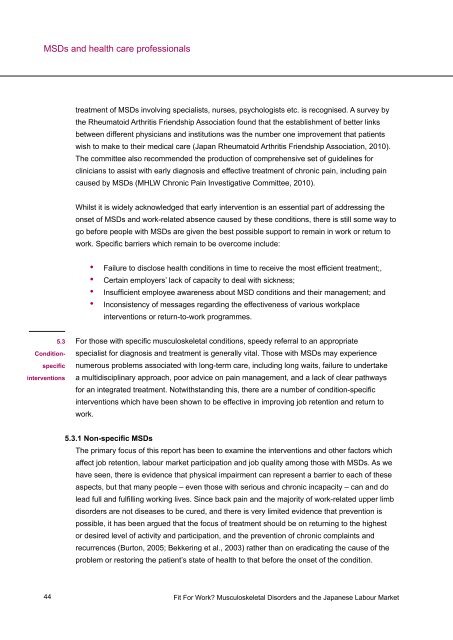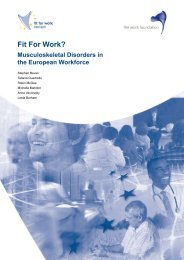English version - Fit for Work Europe
English version - Fit for Work Europe
English version - Fit for Work Europe
You also want an ePaper? Increase the reach of your titles
YUMPU automatically turns print PDFs into web optimized ePapers that Google loves.
MSDs and health care professionals<br />
44<br />
5.3<br />
Condition-<br />
specific<br />
interventions<br />
treatment of MSDs involving specialists, nurses, psychologists etc. is recognised. A survey by<br />
the Rheumatoid Arthritis Friendship Association found that the establishment of better links<br />
between different physicians and institutions was the number one improvement that patients<br />
wish to make to their medical care (Japan Rheumatoid Arthritis Friendship Association, 2010).<br />
The committee also recommended the production of comprehensive set of guidelines <strong>for</strong><br />
clinicians to assist with early diagnosis and effective treatment of chronic pain, including pain<br />
caused by MSDs (MHLW Chronic Pain Investigative Committee, 2010).<br />
Whilst it is widely acknowledged that early intervention is an essential part of addressing the<br />
onset of MSDs and work-related absence caused by these conditions, there is still some way to<br />
go be<strong>for</strong>e people with MSDs are given the best possible support to remain in work or return to<br />
work. Specific barriers which remain to be overcome include:<br />
• Failure to disclose health conditions in time to receive the most efficient treatment;,<br />
• Certain employers’ lack of capacity to deal with sickness;<br />
• Insufficient employee awareness about MSD conditions and their management; and<br />
• Inconsistency of messages regarding the effectiveness of various workplace<br />
interventions or return-to-work programmes.<br />
For those with specific musculoskeletal conditions, speedy referral to an appropriate<br />
specialist <strong>for</strong> diagnosis and treatment is generally vital. Those with MSDs may experience<br />
numerous problems associated with long-term care, including long waits, failure to undertake<br />
a multidisciplinary approach, poor advice on pain management, and a lack of clear pathways<br />
<strong>for</strong> an integrated treatment. Notwithstanding this, there are a number of condition-specific<br />
interventions which have been shown to be effective in improving job retention and return to<br />
work.<br />
5.3.1 Non-specific MSDs<br />
The primary focus of this report has been to examine the interventions and other factors which<br />
affect job retention, labour market participation and job quality among those with MSDs. As we<br />
have seen, there is evidence that physical impairment can represent a barrier to each of these<br />
aspects, but that many people – even those with serious and chronic incapacity – can and do<br />
lead full and fulfilling working lives. Since back pain and the majority of work-related upper limb<br />
disorders are not diseases to be cured, and there is very limited evidence that prevention is<br />
possible, it has been argued that the focus of treatment should be on returning to the highest<br />
or desired level of activity and participation, and the prevention of chronic complaints and<br />
recurrences (Burton, 2005; Bekkering et al., 2003) rather than on eradicating the cause of the<br />
problem or restoring the patient’s state of health to that be<strong>for</strong>e the onset of the condition.<br />
<strong>Fit</strong> For <strong>Work</strong>? Musculoskeletal Disorders and the Japanese Labour Market







